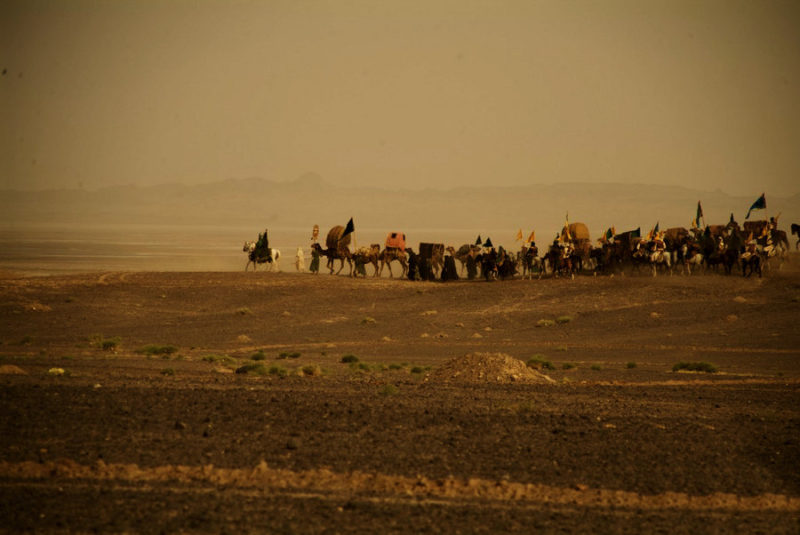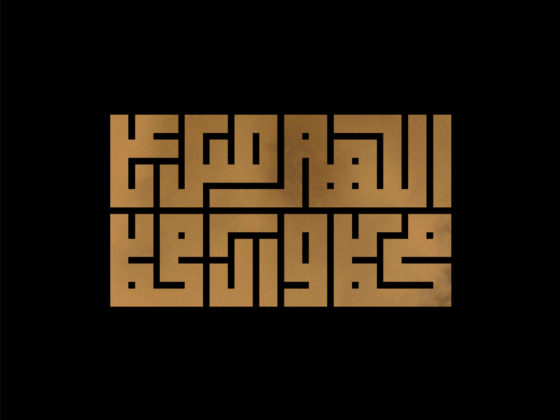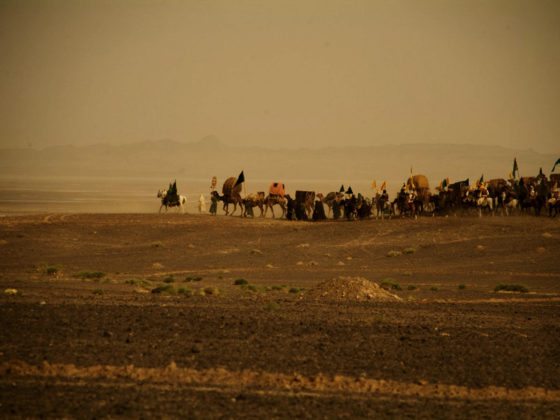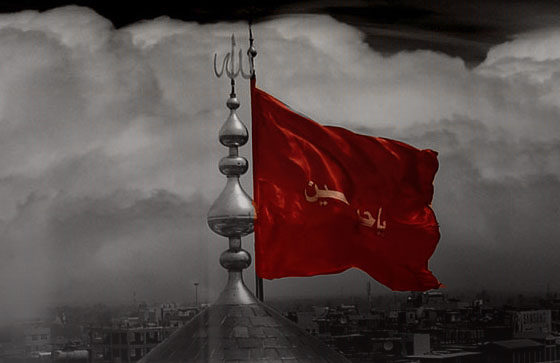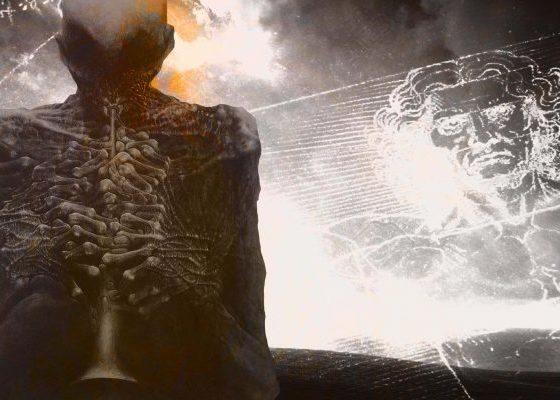Ibn Sa’d and a number of historians following him cite a report of a meeting between Imam Hussein (A) and Ibn Umar (the son of Umar ibn Khattab) and Ibn Ayyash (a famous reciter of the Quran in his time). As far as we can assume, this meeting took place soon after the Imam (A) left Mecca – provided that the reports of historians can be trusted.
Let us recall that all the reports that have reached us about the movement and martyrdom of Imam Hussein (A) are divided into two large groups: hadiths from Ahl al-Bayt (i.e. the Messenger of Allah and the Immaculate Imams, peace be upon them) and reports from historians. There is a fundamental difference between these two groups, since most historians who wrote about the tragedy of Karbala belonged to the Sunni school and tried to impose their own interpretation on the events of Karbala, which boiled down to the fact that Husayn (A) raised a rebellion and was killed in the process, relying on traitors from among the people of Kufa. In the previous parts of this cycle, we said that from then until the present day, this false, falsified version has been the mainstay and mainstream when considering the events associated with Karbala, at least among the “school of the caliphs”, but even those who consider themselves followers of Husayn (A), willingly or unwillingly, with or without knowledge, often reproduce it.
In an effort to confirm this reading, the historians of the “mass people” did not avoid gross manipulations and inventions of non-existent events, such as the story of the letters of the Imam (A) to Basra (which we analyzed in detail in the previous part dedicated to Imam Hussein in Mecca). Thus, the reports of historians on our topic must be approached with caution, subjecting them to a thorough analysis for reliability.
So, the report of Ibn Saad from his book “Tabaqat” (the chapter dedicated to Imam Hussein ibn Ali) that we are analyzing is as follows:
“Abdullah ibn Umar and Abdullah ibn Ayash ibn Abi Rabia met the two of them (Imam Hussein and Ibn Zubair) in Abwa on their return from Umrah. Ibn Umar said to them: “I call upon you by Allah to return and engage in what is righteous among the people, and wait! If the people unite in this (matter of governance), then you should not give it up, and if they disagree in this, then that will be what you wish!”
Then Ibn Umar said to Husayn (A): “Do not go out (do not rebel), for Allah has given the Messenger of Allah (S) a choice between the near and the Hereafter, and he has chosen the Hereafter. You are part of him (the Messenger of Allah), and therefore you will not reach the near world.”
After that, he (Ibn Umar) embraced him, wept, and said goodbye to him.”
Immediately after this, Ibn Sa’d narrates the following: “And Ibn Umar said: ‘Husayn ibn Ali defeated us with his exit (or rebellion). But by my life, he saw the example of his father and brother and saw how the people stirred up trouble against them and abandoned them. This should have kept him from moving for the rest of his life and made him take the righteous path that the people were on. For goodness lies in unity (jama’ah).”
Then Ibn Sa’d narrates the words of Ibn Ayash, who said to Imam Hussein (A): ‘Where are you going, O son of Fatima?’ He replied: “To Iraq and to my Shiites.” Ibn Ayash said: “I hate where you are going. You are going to the people who killed your father and attacked your brother until he left them in anger at them. I call upon you by Allah, do not deceive yourself!”
The analysis of this historical message must begin with the fact that there is obvious confusion in the text itself. From the text it can be understood that this meeting took place when Imam (A) was leaving Medina. However, as is known, Imam (A) did not leave with Ibn Zubayr and did not cross paths with him on the way, and therefore they could not have been seen together. Further, the message states that the meeting took place in Abwa (an area near Medina), whereas the route that Imam (A) chose when leaving Medina did not pass through Abwa.
The third strange point is that Imam (A) directly told Ibn Ayyash that he was going to Iraq. But nothing indicates that Imam (A) wanted to go to Iraq when leaving Medina. This decision was made later, when he was in Mecca, and therefore he could only have spoken about it when leaving Mecca.
Obviously, in the transmission of this there was confusion and mixing of the messages, and if this meeting really took place, then it must have taken place when leaving Mecca. However, this is not so important for us, since our goal is the content of the conversation and the words of the Imam (A) in response to the outrageous things that the son of Umar and Ibn Ayyash said to him.
We see that Ibn Umar made the jamaat and the unity of people the standard by which the actions of all who wish to be righteous and God-fearing should be judged. This pathetic standard was created by Saqifah to justify the crimes of its participants. It consists in the fact that someone’s actions must be approved by the majority of Muslims, and if this is not the case, then he will be considered a Kharijite, a troublemaker and a schismatic, violating the “unity of the ummah”. The distorted criterion of “unity” changes depending on the interests and benefits of those who exercise power over the people in this ummah, being a follower of Saqifah. This criterion is created in opposition to the true standard that Allah Almighty Himself established and the Messenger of Allah (S) confirmed with his mouth – the “two precious things”, the Quran and Ahl al-Bayt. These “two precious things” are appointed by God, and people do not play any role here, and nothing depends on their agreement or disagreement. They have no choice but to submit to the “two precious things” – if, of course, they want success in the near and future life.
In the previous section, where we discussed the events in Mecca, we also saw how Ibn Umar constantly repeats such things that cause nausea and boredom. The essence of his words is the need to follow what people think is good and not contradict what they think is right. The Imam (A), as Ibn Umar states, has no right to deviate from the opinion of the people, and only if the people disagree, then he has the right to be among those who disagree. It is clear that Ibn Umar sees the Imam (A) among the rebels against the authority of Yazid, around whom the people gathered, pledging allegiance to him. He attributes to him the desire for the “near world”, and not the future, and the pursuit of power, while God chose the future life for him. In this he follows his master Yazid, who with the greatest persistence tried to characterize the exit of the Imam (A) from Medina or Mecca as a “rebellion” or “uprising.” Whereas, both when leaving Medina and when leaving Mecca, the Imam (A) did not leave a single statement or declaration about the intention to “rebel,” “make a revolution,” or do anything similar. On the contrary, he repeatedly answered those who asked him about the reason for leaving Medina or Mecca that he was threatened with murder and that he feared the violation of the sanctity of the Two Holy Mosques, and therefore was forced to leave.
Thus, Ibn Umar describes Imam Husayn ibn Ali (A) as a “rebel” and a “Kharijite” who goes against the authority of Yazid, on which people were united, with the aim of destroying the unity of Muslims and the desire for peace in the near future. This is the attitude that was hidden in his soul and which he strives to convey to others. In his opinion, Imam Hussein (A) moved from land to land, from city to city, carrying with him the entire Family of the Messenger of Allah (S), with women and children, for the sake of striving for rebellion!
Then the report says that Ibn Umar allegedly cried when bidding farewell to the Imam (A). If this was indeed the case, were these tears of joy and gloating? Was it a cry of despair at the impossibility of achieving the goals that his masters set for him? Was it a cry for the murder of the Imam (A), because he knew that his enemy was a tyrant and oppressor who would pursue him wherever he went and would stop at nothing to kill him?
The report goes on to say that Ibn Umar claimed that Imam Hussein (A) had “defeated” them with his (supposed) rebellion. By this he means that those like him, being wise and insightful people, “fought” Hussein (A) with words and appeals, holding him back from his intentions, but he did not listen to them and was killed.
So we see here that Ibn Umar, for all his idiocy, is painting a picture that the Umayyads and Yazid had chosen at the stage of preparing to kill the Imam (A) – a malicious and dark fabrication that still casts a shadow over the events of Karbala: that Imam Hussein (A), contrary to the advice of many “wise” people, spoke out against the ruler, thereby forcing the latter to kill himself. He believed the promises and letters of the people of Kufa, and rebelled, relying on their support, forgetting how they had betrayed his father (A) and brother (A).
Ibn Umar and his masters sought to perpetuate this distorted reading and to interpret events in accordance with the will of the oppressor, touching the same chord and uttering the same lamentations in order to turn the image of the Imam (A) upside down in the minds… As if he attacked the ruler of his time, knowing that he would not be able to remove him from office, while the drunken monkey Yazid was only defending himself, being at the peak of his power and strength.
However, in reality, these fabrications and conjectures are easily refuted by the following:
- The goal of the movement of Imam Husayn (A) was not an uprising or a rebellion, but the defense of himself and his Family. He himself repeatedly proclaimed this goal, and it was repeated after him by all the participants in the events of Karbala who were on his side: “We are defending Husayn (A) and the Family of the Prophet (S).”
When the drunken monkey Yazid took the throne after the death of the great monkey tyrant Muawiya, the Umayyads surrounded the Imam (A) to kill him wherever he was, by any means, be it arrest, sneak attack or fighting him. Thus, they forced the Imam (A) to defend himself, and, in fact, to choose between methods of killing himself, and of all of them, he chose death in battle. As he himself said about this: “By Allah, even if I hide in a hole underground, they will get me out of there in order to carry out with me what they want. By Allah, they will violate my rights, as the Jews violated the Sabbath!” 2. The “wise” people who pestered the Imam (A) with their advice not to go to Kufa and to remember what the Kufans did to his father (A) and brother (A) could not have been wiser than the grandson of the Prophet (S) and the Commander of the Youths of Paradise, who, moreover (unlike these “wise men”) was a direct participant and witness of those events, and therefore knew about them better than they did. This means that the purpose of his trip to Kufa was different, namely:
The Umayyads and the people who ran after them, sticking out their tongues to swallow the impurities they excreted, put the Imam (A) in such a position that he had nowhere to go except to Kufa, despite knowing about the betrayal of the Kufans. Responding to their potential invitation was better than being killed near the Two Holy Mosques, waiting for an ambush, a secret assassination attempt, or arrest. Moreover, there were believers in Iraq and Kufa who were waiting for the opportunity to join the Imam (A) and indeed did so, giving their lives for him on the day of Ashura. It is often forgotten that not only were the opponents of the Imam (A) at Karbala Kufans, but the vast majority of his companions (apart from the people of his Family) were also Kufans.
That rebellion and mutiny that people like Ibn Umar attributed to the Imam (A) was in fact raised by the Umayyads and before them by the accursed Saqifah, who usurped power in this Ummah, contrary to the command of Allah and His Messenger (S). The rebellion against Allah, the Prophet (S) and Ahl al-Bayt (A) was planted in the ground by Saqifah, and was cultivated and nurtured by Muawiyah and the Umayyads. This is the rebellion that killed Fatima Zahra (A), then the Commander of the Faithful Ali (A), then Hasan (A) – and now was about to kill the last of the “Ashabi al-Kisa”, Husayn ibn Ali (A).
May Allah bless the oppressed Imam! He did not move from his place while he lived in Medina, and did not take any action against them. On the contrary, they themselves started a war against him, sending messenger after messenger to demand that he take the oath of allegiance to Yazid. This resulted in his hasty departure from Medina to Mecca, and then from Mecca to Kufa. Had he remained in Medina or Mecca, or been near the Kaaba, or hidden in the mountains and caves, or lived in his house, in any of these cases they would have attacked him with the aim of killing him.
As for Ibn Ayyash’s statement, it is clear from the text that he heard Ibn Umar’s words, but he took the initiative to question the Imam (A.S.) and instruct him as if he had not understood anything! He addressed him as “O son of Fatima!” – a majestic and exalted title that elevates its owner to a position unattainable for anyone in the world. The descendants of the Prophet (S) were always proud of this noble lineage, and the Immaculate Imams (A) taught their Shiites to address Husayn (A) in his ziyarat: “O son of Fatima Zahra!” However, the unfortunate enemies were overcome with envy at the fact that they themselves were deprived of participation in this source of purity, chastity and nobility. Therefore, they used this nickname, accompanying it with slander, fabrications, backbiting and insinuations, just as their fallen monkey Yazid did when he reduced everything that the Commander of Martyrs (A) and his family claimed to their pride in their mother (A).
Further, in response to the question of where he is heading, the Imam (A) gives only two words: “Iraq and my Shiites.” This answer does not correspond to the fact that the meeting took place in Abwa after Ibn Umar and Ibn Ayash returned from Umrah and Imam Hussain (A) left Medina. It is quite clear that the Imam (A) did not make any statement upon his departure from Medina indicating that he (peace be upon him) wanted to go to Iraq, and no letter had yet reached him from the people of Kufa. This makes it most likely that there was confusion and error in the transmission of this message, and the meeting mentioned in it took place upon the departure of the Imam (A) from Mecca, and not from Medina.
Apparently, by “my Shiites” the Imam (A) meant the few sincere believers who later joined him to defend him and his Family, and met with their bodies the blows of swords, arrows and spears on the day of Ashura. Iraq was their stronghold, just as Iraq remains to this day the sacred center of Shiism and the focus of its spirit.
In response to this, Ibn Ayash repeats the words of Ibn Umar in a different variation, saying: “I hate where you are going. You are going to the people who killed your father and attacked your brother until he left them in anger at them. I call you by Allah, do not deceive yourself!”
He forgets that the people killed his father (A) and attacked his brother (A) by the order of the Umayyads and their predecessors, and today they rule the Ummah that has pledged allegiance and obeys them, be it in Iraq, Medina, Mecca, Sham or any other area. The same people expelled the Prophet (S) from Mecca and killed his companions, and they would have killed him if it were not for the protection of Allah and the sacrifice of Imam Ali (A), which he was ready to make for him. Then they killed the beloved of his heart, Fatima Zahra (A), by attacking her house in Medina. And if Imam Hussain (A) does not go to Kufa, he will remain among the same people who did all this. Then his statement “I hate where you are going” and, finally, the call of the Imam (A) not to deceive himself show the extent of his insolence and arrogance towards the one whom Allah Almighty chose. It is difficult to express the degree of indignation of anyone familiar with the position of the Imam (A) towards this pathetic group that opposed him sometimes with insolence, sometimes with condescension! In the previous part, dedicated to Imam Hussein (A) in Mecca, we have already analyzed a number of similar statements and statements. And it is obvious that their annoying repetition of the same thing could not be just stupidity, but pursued a certain goal.
Did they really know what happened to the Commander of the Faithful, the father of Imam Hussein (A), and Hasan Mujtaba (A), his brother, and he himself did not know?
Were they living in Kufa at that time and he was not there?
Did they remember those events and he forgot?
Did they experience the pain of their deception and their blades and he did not?
Did they know the people of Kufa and he did not? Didn’t Imam Hussein (A) interact with them directly while living among them? Didn’t he know their tribes, their elders, their warriors, their prominent figures and their groups? Wasn’t he an expert in their customs and their behavior?
All this is obvious even if we leave aside the position of Imamate and the knowledge of the unseen that Husayn ibn Ali (A) was endowed with. Even if we imagine that he was an ordinary person, his knowledge of the Kufis was still incomparably greater than theirs, because he, and not they, lived among them, and everything that happened concerned him directly, while they watched from afar! So how could they repeat the same words over and over again, at every meeting and conversation? Obviously, they had hidden motives dictated by their desire to serve the tyrant of their time. As if they warned Husayn ibn Ali (A), cautioned and admonished him, but he “defeated” their advice and admonitions, in the words of Ibn Umar, and therefore there is no responsibility on the Umayyads and their servants if they decide to kill him. After all, he “deceived himself” by feeding them his flesh and the flesh of his family! He is the one who gave them power over himself and the opportunity to kill him!
This is the stinking lie that Yazid invented and is still spread by people who have grabbed onto the tip of Yazid’s tail. Imam Hussein (A) himself answered them and refuted them many times, in particular, in his will to his brother Muhammad ibn Hanafiyya, where he says that his exit and his movement were neither evil, nor arrogance, nor haughtiness, nor the spread of wickedness – none of these qualities that the Umayyads tried to attribute to him were inherent in him. He did not raise unrest and did not strive for power in this near world – he defended himself and the Family of the Prophet (S) from the hands of tyrants and wicked people.
